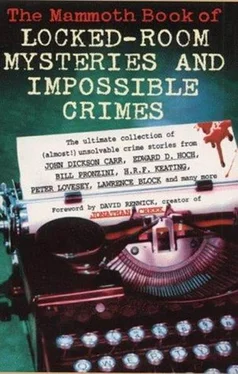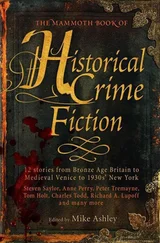Mike Ashley - The Mammoth Book of Locked-Room Mysteries And Impossible Crimes
Здесь есть возможность читать онлайн «Mike Ashley - The Mammoth Book of Locked-Room Mysteries And Impossible Crimes» весь текст электронной книги совершенно бесплатно (целиком полную версию без сокращений). В некоторых случаях можно слушать аудио, скачать через торрент в формате fb2 и присутствует краткое содержание. Жанр: Детектив, на английском языке. Описание произведения, (предисловие) а так же отзывы посетителей доступны на портале библиотеки ЛибКат.
- Название:The Mammoth Book of Locked-Room Mysteries And Impossible Crimes
- Автор:
- Жанр:
- Год:неизвестен
- ISBN:нет данных
- Рейтинг книги:3 / 5. Голосов: 1
-
Избранное:Добавить в избранное
- Отзывы:
-
Ваша оценка:
- 60
- 1
- 2
- 3
- 4
- 5
The Mammoth Book of Locked-Room Mysteries And Impossible Crimes: краткое содержание, описание и аннотация
Предлагаем к чтению аннотацию, описание, краткое содержание или предисловие (зависит от того, что написал сам автор книги «The Mammoth Book of Locked-Room Mysteries And Impossible Crimes»). Если вы не нашли необходимую информацию о книге — напишите в комментариях, мы постараемся отыскать её.
A new anthology of twenty-nine short stories features an array of baffling locked-room mysteries by Michael Collins, Bill Pronzini, Susanna Gregory, H. R. F. Keating, Peter Lovesey, Kate Ellis, and Lawrence Block, among others.
The Mammoth Book of Locked-Room Mysteries And Impossible Crimes — читать онлайн бесплатно полную книгу (весь текст) целиком
Ниже представлен текст книги, разбитый по страницам. Система сохранения места последней прочитанной страницы, позволяет с удобством читать онлайн бесплатно книгу «The Mammoth Book of Locked-Room Mysteries And Impossible Crimes», без необходимости каждый раз заново искать на чём Вы остановились. Поставьте закладку, и сможете в любой момент перейти на страницу, на которой закончили чтение.
Интервал:
Закладка:
A suggestive sight. Now cleansed of blood, it was a long, thin, heavy blade with a light metal handle and cross-piece. As Colonel March turned it round, glittering in the light, Jerry Winton felt that its glitter struck a chord of familiarity in his mind: that a scene from the past had almost come back to him: that, for a swift and tantalizing second, he had almost grasped the meaning of the whole problem.
“And now we come to my third reason,” said Colonel March. “The third reason is Ferdie Davos. Ferdie was a hotel thief. A great deal too clever for us poor policemen. Eh, Goron? Though I always told him he was a bad judge of men. At the height of the summer season, at hotels like the Brittany and the Donjon, he had rich pickings. He specialized in necklaces; particularly in pearl necklaces. Kindly note that.”
A growing look of comprehension had come into Eleanor Hood’s face. She opened her mouth to speak, and then checked herself.
“His problem,” pursued Colonel March, “was how to smuggle the stolen stuff over to England, where he had a market for it. He couldn’t carry it himself. In a little place like La Bandelette, Goron would have had him turned inside out if he had as much as taken a step towards Boulogne. So he had to have accomplices. I mean accomplices picked from among the hordes of unattached young men who come here every season. Find some young fool who’s just dropped more than he can afford at the tables; and he may grab at the chance to earn a few thousand francs by a little harmless customs bilking. You follow me, Mr Winton?”
“You mean that I was chosen -?”
“Yes.”
“But, good lord, how? I couldn’t smuggle a pearl necklace through the customs if my life depended on it.”
“You could if you needed a tonic,” Colonel March pointed out. “Davos told you so. The necklace would first be taken to pieces for you. Each pearl would be given a thick sugar-coating, forming a neat medicinal pill. They would then be poured into a neat bottle or box under the prescription of a well-known doctor. At the height of the tourist rush, the customs can’t curry-comb everybody. They would be looking for a pearl-smuggler: not for an obviously respectable young tourist with stomach trouble.”
Eleanor Hood, with sudden realization in her face, looked at the box of pills on M. Goron’s desk.
“So that is why you tasted my pills!” she said to the prefect of police, who made deprecating noises. “And kept me here for so long. And -”
“Mademoiselle, I assure you!” said M. Goron. “We were sure there was nothing wrong with those pills!” He somewhat spoiled the gallant effect of this by adding: “There are not enough of them, for one thing. But, since you received them from Dr Hébert after office hours, you had to be investigated. The trick is neat, hein? I fear the firm of Hebert and Davos have been working it for some time.”
They all turned to look at Dr Hébert.
He was sitting bolt upright, his chin drawn into his collar as though he were going to sing. On his face was a look of what can only be called frightened scepticism. Even his mouth was half open with this effect, or with unuttered sounds of ridicule.
“We were also obliged to delay you all,” pursued M. Goron, “until my men found Madame Fley’s pearls, which were stolen a week ago, hidden in Dr Hébert’s surgery. I repeat: it was a neat trick. We might never have seen it if Davos had not incautiously hinted at it to M. Winton. But then Davos was getting a bit above himself.” He added: “That, Colonel March thinks, is why Dr Hébert decided to kill him.”
Still Dr Hébert said nothing.
It was, in fact, Jerry Winton who spoke. “Sir, I don’t hold any brief for this fellow. I should think you were right. But how could he have killed Davos? He couldn’t have!”
“You are forgetting,” said Colonel March, as cheerfully as though the emotional temperature of the room had not gone up several degrees, “you are forgetting the two note-cases. Why was Davos carrying two note-cases?”
“Well?”
“He wasn’t,” said Colonel March, with his eye on Hebert.
“Our good doctor here was, of course, the brains of the partnership. He supplied the resources for Ferdie’s noble front. When Ferdie played baccarat at the Casino, he was playing with Dr Hébert’s money. And, when Dr Hébert saw Ferdie at the Casino to-night, he very prudently took away the large sum you saw in Ferdie’s note-case at the tables. When Ferdie came to the doctor’s house at midnight, he had only his few hundred francs commission in his own note-case, which was in his pocket.
“You see, Dr Hébert needed that large sum of money in his plan to kill Ferdie. He knew what time Ferdie would call at his house. He knew Mr Winton would be close behind Ferdie. Mr Winton would, in fact, walk into the murder and get the blame. All Dr Hébert had to do was take that packet of mille notes, stuff them into another note-case just like Ferdie Davos’s, and use it as a trap.”
“A trap?” repeated Eleanor.
“A trap,” said Colonel March.
“Your presence, Miss Hood,” he went on, “gave the doctor an unexpected alibi. He left you downstairs in his house. He went upstairs to ‘get dressed.’ A few minutes before Davos was due to arrive, he went quietly up to the roof of his house – a flat roof, like most of those in La Bandelette. He looked down over the parapet into that cul-de-sac, forty feet below. He saw his own doorstep with the lamp burning over it. He dropped that note-case over the parapet, so that it landed on the pavement before his own doorstep.
“Well?” continued Colonel March. “What would Davos do? What would you do, if you walked along a pavement and saw a note-case bulging with thousand-franc notes lying just in front of you?”
Again Jerry Winton saw that dim cul-de-sac. He heard the rain splashing; he saw it moving and gleaming past the door-lamp, and past the beam of the lighthouse overhead. He saw the jaunty figure of Davos stop short as though to look at something -
“I imagine,” Jerry said, “that I’d bend over and pick up the note-case.”
“Yes,” said Colonel March. “That’s the whole sad story. You would bend over so that your body was parallel with the ground. The back of your neck would be a plain target to anybody standing forty feet up above you, with a needle-sharp knife whose blade is much heavier than the handle. The murderer has merely to drop that knife: stretch out his fingers and drop it. Gravity will do the rest.
“My friend, you looked straight at that murder; and you never saw it. You never saw it because a shifting, gleaming wall of rain, a kind of silver curtain, fell across the doorlamp and the beam of the lighthouse. It hid the fall of a thin, long blade made of bright metal. Behind that curtain moved invisibly our ingenious friend Dr Hébert, who, if he can be persuaded to speak -”
Dr Hébert could not be persuaded to speak, even when they took him away. But Eleanor Hood and Jerry Winton walked home through the summer dawn, under a sky coloured with a less evil silver; and they had discovered any number of mutual acquaintances by the time they reached the hotel.
THE STOLEN SAINT SIMON by Michael Kurland
Michael Kurland (b.1938) first established his name in the science fiction field in the psychedelic sixties, when he wrote several amusing books which turned a number of accepted sf icons on their head, including Ten Years to Doomsday (1964), written with Chester Anderson, and The Unicorn Girl (1969). Although he has continued to produce novels using sf themes, he has broadened his writing to cover crime and mystery fiction. Sometimes, as in Star Griffin (1987), he blends the two. His early book , A Plague of Spies (1969), received an Edgar Allan Poe Scroll from the Mystery Writers of America. He has produced several Sherlock Holmes pastiches featuring Moriarty – The Infernal Device ( 1979 ), Death by Gaslight (1982) and The Great Game (2001) – and continued the excellent Lord Darcy series started by Randall Garrett , Ten Little Wizards (1988), which is chock full of impossible crimes, and A Study in Sorcery (1989). The following story gives us not one but two impossible crimes.
Читать дальшеИнтервал:
Закладка:
Похожие книги на «The Mammoth Book of Locked-Room Mysteries And Impossible Crimes»
Представляем Вашему вниманию похожие книги на «The Mammoth Book of Locked-Room Mysteries And Impossible Crimes» списком для выбора. Мы отобрали схожую по названию и смыслу литературу в надежде предоставить читателям больше вариантов отыскать новые, интересные, ещё непрочитанные произведения.
Обсуждение, отзывы о книге «The Mammoth Book of Locked-Room Mysteries And Impossible Crimes» и просто собственные мнения читателей. Оставьте ваши комментарии, напишите, что Вы думаете о произведении, его смысле или главных героях. Укажите что конкретно понравилось, а что нет, и почему Вы так считаете.










